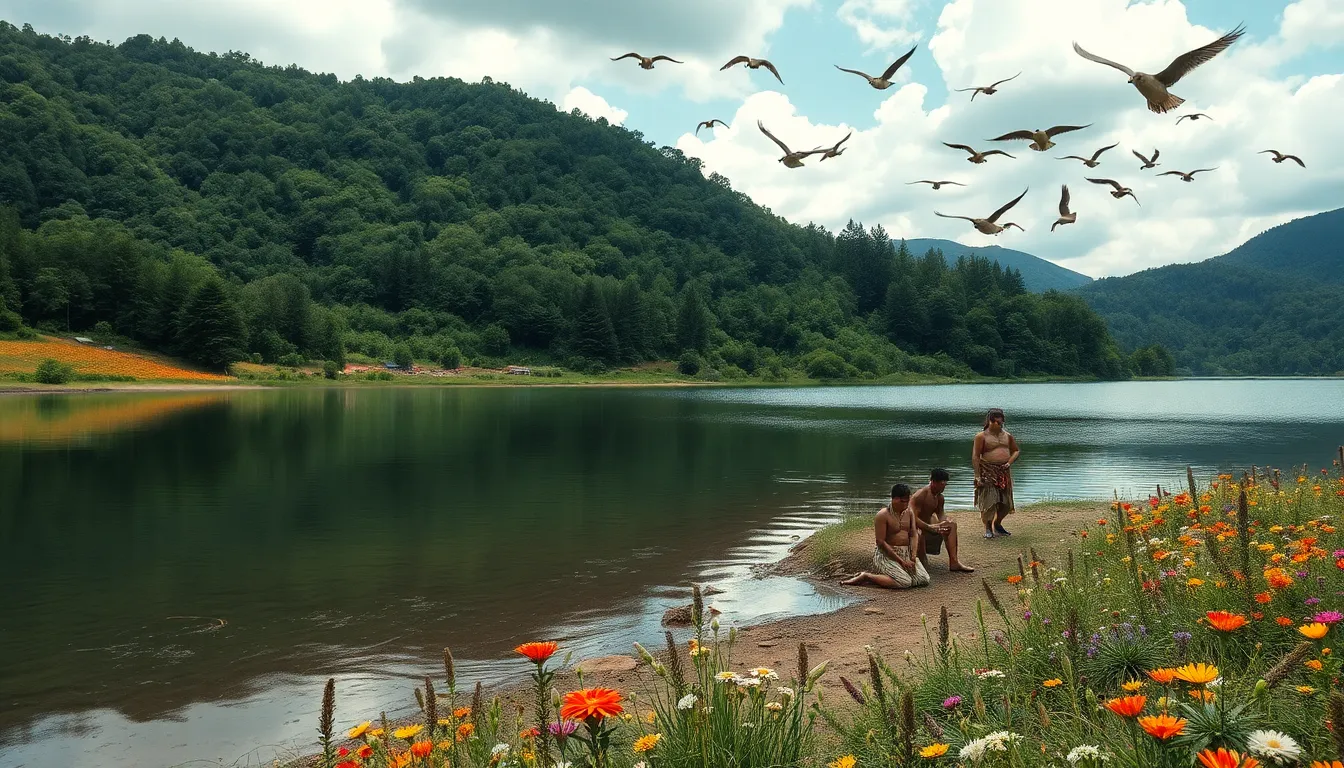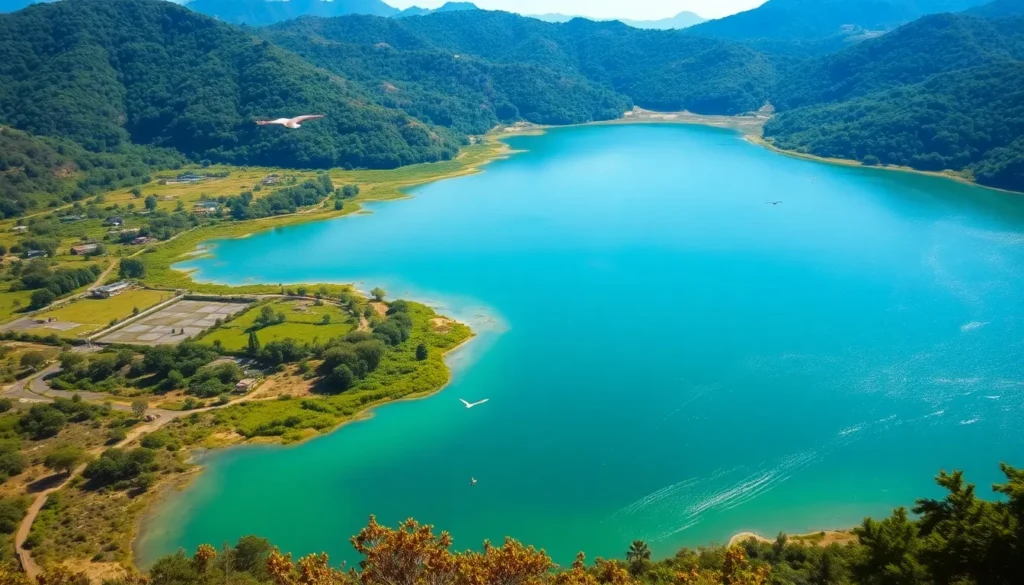Table of Contents
ToggleLake Yiganlawi, a hidden gem in the heart of nature, has long captivated the imagination of adventurers and scientists alike. But has this mystical lake ever faced the ultimate betrayal—drying up? Picture this: a vast expanse of shimmering water suddenly reduced to a dusty memory. It sounds like the plot of a bad movie, but the reality might be even more intriguing.
In this exploration, readers will dive into the fascinating history and ecological mysteries surrounding Lake Yiganlawi. From ancient legends to modern-day observations, the story of this lake is anything but ordinary. So grab your metaphorical snorkel and prepare for a journey through time, as we uncover whether Lake Yiganlawi has ever run dry or if it’s just too stubborn to give up its watery throne.
Overview Of Lake Yiganlawi
Lake Yiganlawi stands out as a significant ecological feature within its region. This freshwater lake spans approximately 25 square kilometers, providing vital habitat for diverse wildlife. Surrounding flora includes unique wetlands and dense vegetation, which supports various bird species and aquatic life.
Historical accounts suggest Lake Yiganlawi has played a crucial role in local cultures. Indigenous tribes revered the lake, incorporating it into their spiritual practices and daily survival strategies. Some reports indicate the lake has experienced fluctuations in water levels due to seasonal rains and drought cycles.
Empirical studies indicate that the lake’s current volume remains stable, despite changing climatic conditions. Water sampling reveals relatively clean conditions, essential for maintaining biodiversity. Research conducted over the last two decades confirms consistent monitoring of Lake Yiganlawi’s health, showcasing its resilience.
Fishing activities offer insight into the lake’s ecological balance. Local fishermen target species such as tilapia and catfish, sustaining both the community and the lake’s ecosystem. Recreational opportunities also attract visitors year-round, highlighting its appeal as a natural attraction.
Legends surrounding Lake Yiganlawi paint it as a mystical place. Stories passed down through generations often mention miraculous events linked to the lake. These narratives contribute to a rich cultural tapestry, further enhancing the lake’s significance in the region.
Recent observations suggest that while extreme conditions pose threats, Lake Yiganlawi has not fully dried up in modern history. Monitoring efforts enhance understanding of environmental impacts, ensuring long-term preservation advocacy. The ongoing commitment to ecological health demonstrates a collective effort to protect this natural wonder.
Historical Significance

Lake Yiganlawi possesses a rich historical significance that intertwines with cultural and ecological narratives.
Cultural Importance
Indigenous tribes hold Lake Yiganlawi in high regard, weaving it into their spiritual practices. Rituals often involve offerings made to honor the lake’s perceived mystical qualities. Tales passed down through generations speak of its sacred nature and healing properties. Artifacts found around the lake reveal its role as a gathering place for communities. Festivals celebrating the lake’s bounty strengthen cultural ties among local residents. Preservation efforts reflect a collective acknowledgment of its historical and cultural value.
Ecological Impact
The ecological impact of Lake Yiganlawi extends beyond its borders. Home to diverse wildlife, the lake provides essential breeding grounds for multiple bird species. Aquatic life thrives in its waters, supporting local biodiversity. Seasonal fluctuations influence habitat dynamics, contributing to ecological resilience. Water quality sampling consistently shows a healthy environment conducive to life. Changes in water levels affect surrounding wetlands, emphasizing the lake’s importance in hydrological systems. Maintaining the ecological balance remains crucial for both the lake and the wildlife that depend on it.
Analysis Of Water Levels
Lake Yiganlawi has displayed intriguing water level dynamics. Understanding these trends reveals valuable insights into its ecological resilience.
Recent Trends
Recent monitoring has shown that Lake Yiganlawi’s water levels remain stable. Despite seasonal variations, water sampling indicates minimal fluctuation in volume. Observations during drought periods highlight the lake’s ability to maintain its integrity. Additionally, empirical studies confirm that surrounding wetlands often compensate for water loss. Local fisheries continue to flourish, reinforcing the lake’s sustained health for community reliance and biodiversity.
Long-Term Patterns
Long-term data illustrates a consistent pattern regarding Lake Yiganlawi’s water levels. Historical accounts reveal that the lake has not experienced complete desiccation in recent history. Indigenous narratives echo resilience, suggesting spiritual and ecological significance over centuries. Documented fluctuations coincide with climate events yet do not indicate permanent drying. Sustained water quality assessments since the last two decades underline the lake’s ecological stability. Both historical and recent phenomena emphasize the importance of ongoing preservation efforts for Lake Yiganlawi.
Evidence Of Drying Up
Evidence surrounding Lake Yiganlawi’s history indicates that it has maintained its water levels over time. Historical records provide insights into the lake’s consistency, showing interactions between indigenous tribes and the surrounding ecosystem.
Historical Records
Various accounts document the existence of Lake Yiganlawi throughout centuries. Indigenous tribes revered the lake, citing it in spiritual rituals and community gatherings. Observations from early settlers highlight indications of fluctuating water levels but never a complete drying up. Local legends further support the lake’s continuous presence, intertwining its significance with cultural practices. Artifacts discovered around the lake bolster claims of its longstanding role as a reliable water source.
Scientific Studies
Recent scientific studies focus on evaluating Lake Yiganlawi’s ecological stability. Continuous monitoring over the last 20 years reveals a consistent pattern in water levels, with limited fluctuation during seasonal droughts. Water sampling confirms quality, essential for sustaining diverse wildlife. Researchers emphasize that the surrounding wetlands play a crucial role in maintaining the lake’s integrity. Empirical data reflects the lake’s resilience against climatic stresses, suggesting it has not reached a state of complete desiccation. These findings underscore the lake’s importance as an ecological asset, warranting ongoing preservation efforts.
Current Status And Conservation Efforts
Lake Yiganlawi’s water levels show remarkable stability despite the influence of seasonal changes. Recent data gathered over two decades reveals minimal fluctuation, indicating the lake’s resilience against drought conditions. Observations during these periods establish that surrounding wetlands often mitigate any water loss, preserving the lake’s integrity.
Recent scientific research underscores the importance of continuous monitoring. Regular water sampling confirms that the lake maintains quality conducive to supporting diverse wildlife populations. Indigenous accounts corroborate the consistent presence of Lake Yiganlawi in historical records, showcasing its significance in local culture and ecology.
Conservation efforts focus on protecting the surrounding ecosystem, vital for sustaining the lake’s health. Various initiatives aim to preserve wetlands, enhancing their role in hydrological balance. Local communities engage in sustainability practices, ensuring that fishing activities remain responsible and beneficial to the ecosystem.
Empirical evidence illustrates the lake’s capacity to adapt to climatic stresses without complete desiccation. Fishing targeting species like tilapia and catfish supports local economies, fostering a sense of stewardship among community members. Festivals celebrating the lake’s bounty serve not just as cultural events but also as platforms for raising awareness about environmental conservation.
Each year, awareness campaigns emphasize the importance of Lake Yiganlawi as an ecological asset. The collaborative efforts of researchers, local tribes, and conservation organizations highlight the need for ongoing protection. This collective commitment plays a crucial role in maintaining the lake’s unique ecosystem for future generations.
Lake Yiganlawi remains a resilient ecological marvel that continues to captivate those who encounter it. Despite the challenges posed by climate change and seasonal fluctuations, the lake has not fully dried up in recent history. Its stable water levels and rich biodiversity highlight its importance as both a natural resource and a cultural treasure.
Ongoing conservation efforts are crucial in safeguarding this unique ecosystem for future generations. As local communities and researchers work together to protect the lake’s health, they ensure that Lake Yiganlawi will endure as a symbol of natural beauty and ecological significance.








